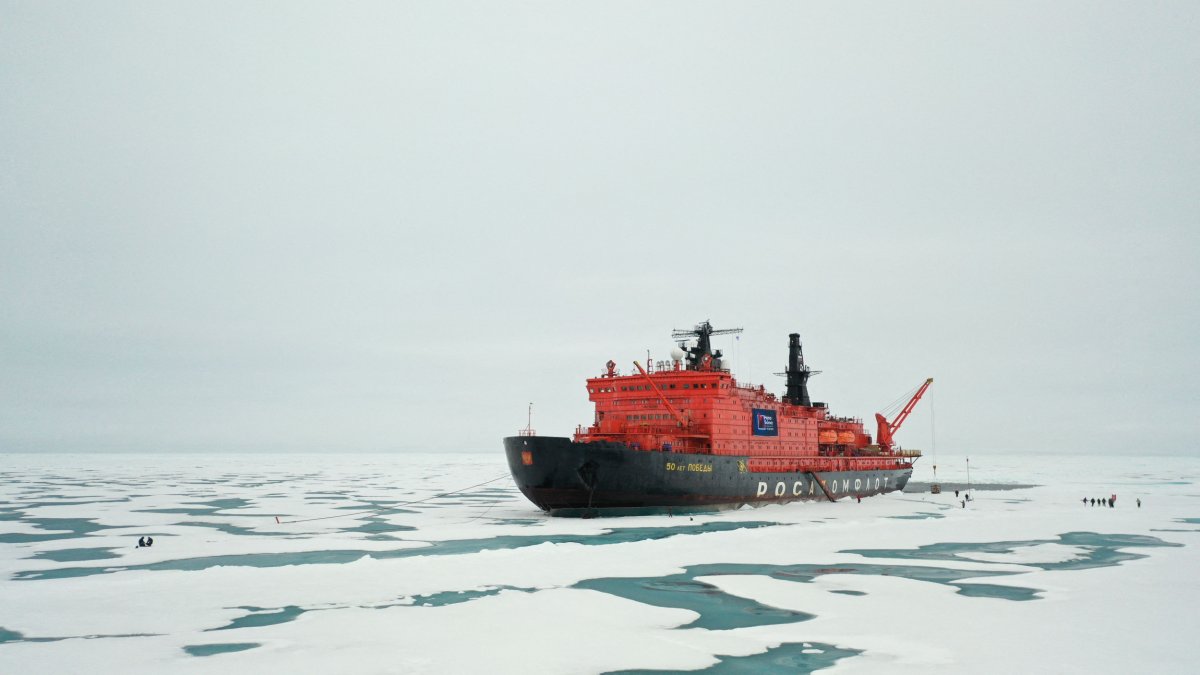The U.S. National Guard has held cold weather drills amid the prospect that the Arctic could be a future flashpoint for hostilities between Russia and the U.S.
The 10-day Northern Strike 23 military exercises in Camp Grayling, Michigan came as President Vladimir Putin's invasion of Ukraine has raised the chances high tensions between Moscow and the West may spill over into the Arctic region.
In visiting the site of the exercises which took place between between January 20 and 29, the Military Times reported U.S. Army Gen. Dan Hokanson, chief of the National Guard Bureau, watched live-fire practice on the M777 Howitzer, one of the NATO weapons used by Ukraine's forces.
Field artillery was the focus of the drills which saw the participation of troops from Latvia, a Baltic state also keeping a watchful eye on the threat posed by Russia.

Malte Humpert, founder and senior fellow of The Arctic Institute think tank, said that the exercises by the U.S. military reserve force "symbolize the U.S. really stepping up more and more to the plate," when it comes to the Arctic region.
"It's not preparing for World War Three," he told Newsweek, "it's just another step, which shows that the U.S. understand Russia is a hostile nation, and that that hostility can potentially extend into the Arctic, which was always seen as a region of exceptionalism."
NATO allies like Norway and potential new alliance members, Sweden and Finland would be counting on U.S. support if there was any confrontation in the region. "We've got to be able to go wherever that potential fight may be, and we need to provide presence there," Hokanson told the Military Times.
Russian Expansion
Two weeks after Putin invaded Ukraine, members of the Arctic Council decided to pause participation in the body, thus cutting cooperation with Russia and its neighbors in the region.
Even with its focus on supplying its war effort, Russia has continued expanding its military bases in the Arctic over the last year with radar bases and runways being improved in the region, CNN reported in December, citing satellite images.
Meanwhile, the Center for Strategic and International Studies (CSIS) said in a report published in January that Moscow's use of hybrid tactics in the Arctic "seems to be increasing in both frequency and severity." This includes allegations denied by Moscow, that it was behind the sabotage of the Nord Stream pipelines and undersea cables in the Arctic and near-Arctic.
In October, the U.S. government-wide Arctic strategy said that Russia's invasion of Ukraine has "raised geopolitical tensions in the Arctic" and created "new risks of unintended conflict."
Russia's military interests in the Arctic are mostly defensive, according to the CSIS. These included protecting its second-strike sea-based nuclear deterrent by the Kola Peninsula, its oil and gas megaprojects like the Yamal LNG and Vostok Oil ventures, and the Northern Sea Route whose role as a future trade thoroughfare is likely to be increased by global warming.
Russia also has offensive goals in the Arctic, the CSIS said, such as using it as a staging ground for power projection, as a possible site for hybrid activities to intimidate European Arctic countries, not to mention the scene of "an unlikely—but not unthinkable—wider NATO-Russia conflict."
"Having escalated to a war, one can imagine Moscow risking a limited incursion into Norway or Finland in a bid to protect its critical nuclear assets in the Kola Peninsula," added the think tank.
Russia's military bases, airfields and the presence of its Northern Fleet in the Murmansk region are part of its significant investment in the region which has not been a top security priority for the United States or NATO in recent years.
"Russia is pushing ahead, and the U.S. is playing catch up to a certain degree," said Humpert, noting that with eight percent of the world's LNG now produced above the Arctic Circle, Russia sees the region as key to its future economic as well as strategic development.
The strength of international agreements has led Humpert to believe that there would not be a fight initiated in the region over its resources. Rather, he says a more likely scenario is a conflict that gets "ignited outside the Arctic and it percolates into the Arctic—where the Arctic becomes a theater of a war."
"One can not only think of large military conflict with ships shooting at each other or missiles or ground based forces. You can also think of it more like a simmering kind of conflict where things get sabotaged, or shipping lanes get blockaded."
"Unless Russia changes its behavior, which doesn't look like it will, I don't think there's any path back to the Arctic that existed pre-2022," he added.
Newsweek has contacted the Russian Foreign Ministry for comment.
Uncommon Knowledge
Newsweek is committed to challenging conventional wisdom and finding connections in the search for common ground.
Newsweek is committed to challenging conventional wisdom and finding connections in the search for common ground.
About the writer
Brendan Cole is a Newsweek Senior News Reporter based in London, UK. His focus is Russia and Ukraine, in particular ... Read more
To read how Newsweek uses AI as a newsroom tool, Click here.








